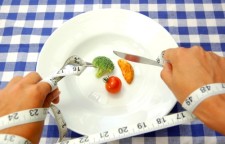Claim#2: Adding Muscle Boosts Your Metabolism
 Wednesday, January 17, 2018 at 8:46AM
Wednesday, January 17, 2018 at 8:46AM 
This is entry #2 in a 9-part series on Metabolic Myths.
Metabolism-boosting hype generally has a grain of truth behind it that has been way overblown. In other cases, long disproved theories continue to be touted because they are super effective as click-bait (or selling books). You rarely see any actual numbers -- how many calories per day will this raise my resting metabolic rate? -- attached to claims. That’s because for the most part the actual increase in resting metabolic rate (or other components of your daily total energy expenditure), is too small to be of any practical significance.
Metabolism mythology has a life of its own though as it gets regurgitated and reposted throughout the internet and fad-diet books (and unfortunately even by many otherwise reputable sources).
Review "Metabolism" here: Metabolic Rate
My last topic was breakfast, today's topic is muscle:
CLAIM: Adding muscle boosts your metabolism or aids in weight loss
Muscle burns more than fat (at rest) so adding muscle will (technically) increase your resting metabolic rate.
It's not that simple, however. Following are two points that essentially throw cold water on this oversimplification.
1) You can't actually ADD muscle while losing weight. The best you can do -- if weight loss is your goal -- is to minimize the loss of skeletal muscle over the weight loss process. The back-story is that when you gain weight you gain both lean body mass (LBM; i.e. muscle) and fat mass (FM)... and then in reverse, when you lose weight, you tend to lose about the same ratio that you gained. The two major factors that impact your change in LBM are actually a) the magnitude of energy deficit you're in, and b) the protein content of your diet.[1][2][3] You need a minimum of 1.2-grams of protein per/kg (2.6-grams/pound) of your body weight to minimize loss of LBM.[4][5][6]
2) Improving your body composition has an insignificant effect on your resting metabolic rate.
If weight loss isn't your goal and you just want to improve your body composition, what could you expect as a good outcome from a strength training program?
Let’s say you engaged in a regular strength training program (spending 120- to 180-minuets per week) for a few months and gained 5 pounds of muscle while also losing 5 pounds of fat. This would be a huge achievement, and a result that a small minority of exercisers are consistent enough to achieve.[7] At the end of the day, the net increase in your resting metabolic rate would be just 19.5 calories per day.
Why so little? Both skeletal muscle and fat (adipose tissue) have low resting metabolic rates (5.9 and 2-calories per pound respectively).[8] The type of muscle (lean body mass) that does burn a lot of calories at rest is organ tissue (heart, brain, kidneys, etc.).[8][9] Strength training won’t increase organ mass.
Here's the math:
[(5-lbs. muscle x 5.9 = 29.5) - (5-lbs. fat x 2 = 10) = 19.5]
That is an increase, but it has no practical significance.
Thankfully, there is some good news.
You will have lost inches from your waist and/or hips, and you will feel better. In fact strength training has been shown to lower (systolic and diastolic) blood pressure, improve insulin resistance, lower LDL-(bad)cholesterol and triglycerides, and raise HDL-(good)cholesterol.[4] Your self-esteem might even be higher.
Strength training clearly has many benefits, but for the average Joe or Jane (who wants to lose weight), increasing your resting metabolic rate isn’t one of them.
While the best advice is that you try to limit your loss of muscle while you lose weight, it's important to understand that your "metabolic rate" will always be smaller when you are smaller!
Sorry, but it is what it is!
All the best!
-Dorene
References:
[1] Weight Loss Composition is One-Fourth Fat-Free Mass: A Critical Review and Critique of This Widely Cited Rule. Heymsfield, et al. Obes Rev 2014;15(4):310-321.
[2] Lean Body Mass-Body Fat Interrelationships in humans. Forbes, GB. Nutr Rev 1987;45(8):225-231.
[3] Body Fat and Fat-Free-Mass Interrelationships: Forbes' Theory Revisited. Hall, KD. Br J Nutr. 2007;97(6):1059-1063.
[4] American College of Sports Medicine Position Stand. Appropriate Physical Activity Intervention Strategies for Weight Loss and Prevention of Weight Regain for Adults. Donnelly, et al. Med Sci Sport Exercise 2009;41(2):459-471.
[5] The role of protein in weight loss and maintenance. Leidy, et al. Am J clin Nutr 2015;101(suppl):1320s-1329s.
[6] Exploration of protein requirement during weight loss in obese older adults. Weijs and Wolfe. Clin Nutr 2016;35(2):394-398.
[7] Body composition in sport and exercise: directions for future research. Wilmore, JH. Med Sci Sport Exerc 1983;15(1):21-31.
[8] Specific metabolic rates of major organs and tissues across adulthood: evaluation by mechanistic model of resting energy expenditure. Wang, et al. Am J Clin Nutr 2019;92:1369-77.
[9] Elia M: Organ and Tissue Contribution to Metabolic Rate, In: Kinney J, Tucker HN (eds). Energy Metabolism: Tissue Determinants and Cellular Corollaries. New York, NY: Raven Press, Ltd.; 1992:61-79.



